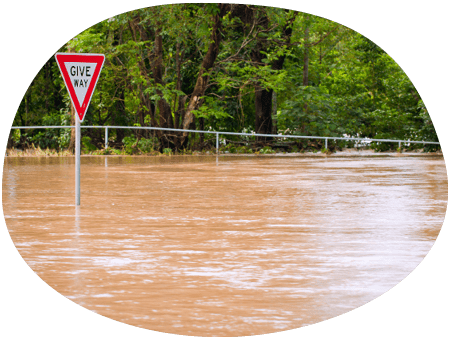Supporting children through unexpected events:
Natural Disasters
Natural disasters can have a significant impact on children and families. In Australia, these events may include bushfires, cyclones, or floods. They can be traumatic and devastating for children, their families and broader communities.
When natural disasters hit, children may encounter an extremely frightening experience or endure significant disruptions and losses. Children can be affected either through direct experience of the event (cyclonic winds, damage to the home) or indirectly through hearing about these events from adults or over the media.
Children are not always able to describe and express their emotions in the same way as adults, so they may not react to stress the same way. However, children are especially vulnerable to the emotional impacts of natural disasters and often rely on adults around them to provide support and protection.

How can natural disasters impact your child?
Younger children, with developing language skills tend to communicate their emotions and stresses through their behaviour. However, as children reach toddler and kindergarten age (2 to 5 years) they are likely to be better able to speak with you about their experiences. It is particularly important to look out for changes in children’s behaviour that suggest they are unsettled or distressed, such as:
- changes in their play, drawing, dreams
- regressive behaviour – children behaving younger than they normally do
- talking constantly about natural disasters
- nightmares
- anxiety about sleeping alone
- trouble getting to sleep
- irritability or anger
- tantrums
- eating less/more or fussy eating
- tummy or other aches
- withdrawing
- wanting to stay close to a parent or carer
How can I support my child?
Provide comfort, consistency and reassurance: It is important to provide enough comfort for your child by being the consistent part of their life, as they witness other changes. If the situation allows, resume typical family routines as soon as possible. Doing so can be reassuring and will help to comfort children with a sense of normalcy. When times are uncertain, it is important for your child to know that you have time for them and that they can still have fun.
Engage in honest and age-appropriate conversations: It helps to communicate with your child in an honest way but remember to keep to the facts in simple terms. For example, “there was a flood that damaged our house”. Only provide information that they need to know. Too much information is unnecessary and can contribute to your child’s feelings of stress. It also helps to let children know what to expect by giving some realistic timeframe to let them know it’s not permanent. For example, “we can’t live at our house for about 3 weeks, and we’ll stay with grandma and grandpa.” It is also recommended to encourage children to label their feelings. Provide validation of their feelings and acknowledge that the disruptions are affecting them.

Know when to seek help: Children are generally very resilient. As with any change or traumatic event in your child’s life, most of the time, their stress will reduce over time with support from families. However, as the situation stabilises, if you still have concerns for your child, it may be possible that your child is still experiencing significant distress and may require additional support. If your concerns are urgent and you require immediate assistance – please contact 000 (Emergency Services - ambulance, police, fire).
If you have concerns about your child’s well-being, you can seek psychological help:
1. Go to a General Practitioner (GP)
2. Ask the GP for a Mental Health Care Plan
3. Through a Mental Health Care Plan your child will be able to access psychological appointments which are free (or minimal cost) after the Medicare rebate.
4. After your first 6 sessions you may need to return to your GP for an assessment of whether ongoing treatment is recommended and to extend your Mental Health Care Plan if needed.

How G8 Education can support you and your family
Please talk to your centre manager if you have been affected by a natural disaster so we can understand how we can best support your family.
If your centre is affected by a natural disaster and needs to close temporarily, your centre manager will advise on any available alternative care arrangements and other support for families.
The Australian Government provides help in an emergency for families and early learning services in disaster declared areas. This can include gap fee waivers and additional allowable absences.
Other useful resources
Information and books:
Fact sheet: Helping children who have been impacted by natural disasters
Fact sheet: Helping children impacted by tragic events
Birdie Books – children's books to help in times of natural disasters
Nationwide services:
Parent Line - or dial 1300 30 1300
Ask Izzy - a mobile website that connects people who are in crisis with the services they need right now and nearby
Australian Red Cross - Emergencies and Disasters
Lifeline – Disaster Relief and Community Recovery
